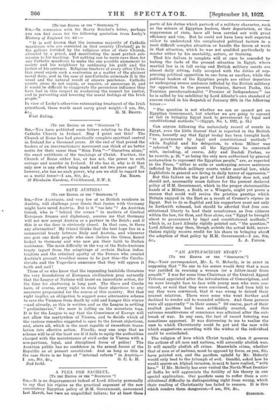A PLEA FOR ZAGHLUL.
[To THE EDITOR OF THE " SPECPATOR."1 SIR,—It is no disparagement indeed of Lord Allenby personally to say that his regime as the practical exponent of the new conciliatory Egyptian policy of H.M. Government, announced Last March, has been an unqualified failure; for at least those parts of his duties which partook of a military character, such as the seizure of Egyptian leaders, their deportation, or the suppression of riots, have all been carried out with great efficiency and vim. But he could not have been well expected either to understand the complicated political factors in a most difficult complex situation or handle the forces at work in that situation, which he was not qualified particularly to master either by his mentality, nature, or training.
That his failure is complete will at once be conceded by testing the facts of the present situation in Egypt, where martial law is in full swing and British military courts are almost daily sitting, fully occupied with the duties of sup- pressing political opposition in one form or another, while the political leaders of the Egyptian people are either deportees or undergoing severe sentences inflicted by the British military for opposition to the present Premier, Sarwat Pasha, the Tunisian pseudo-nationalist "Premier of Independence " (as he is called by his satellites) by Lord Allenby's own standard of success stated in his despatch of January 20th in the following terms :- " The question is not whether we can or cannot get an Egyptian Government, but whether we are going to succeed or fail in bringing Egypt back to government by legal and constitutional methods."—(Egypt, No. 1, 1922, p. 24.) Can anyone following the melancholy record of events in Egypt, even the little thereof that is reported in the British Press, honestly say that Egypt to-day has been brought back " to government by legal and constitutional methods " while Zaghlul and his delegation, to whom Milner was " referred" by almost all the Egyptians he conversed with, including, of course, Adly and Rushdi Pashas, as he records, p. 20, " as being the only men authorized by general acclamation to represent the Egyptian people," are, as reported in the Press, " either in exile or undergoing severe sentences inflicted by British military courts under martial law, while Zaghlulists in general are living in daily terror of oppression."
But this failure on the part of Lord Allenby does not, and should not, necessarily mean failure for the present declared policy of H.M. Government, which in the proper statesmanlike hands of a Milner, a Rodd, or a Wingate, might yet prove a success that could well revive the pristine prestige which Britain enjoyed in the East as a result of Cromer's regime in Egypt. But to do so Zaghlul and his supporters must not only be forthwith released, but should be afforded that free con- stitutional liberty to lead their countrymen as free citizens within the law, for thus, and thus alone, can "Egypt be brought about to government by legal and constitutional methods," which is, as Lord Allenby rightly pointed out, " the question." Lord Allenby may then, though outside the actual field, never- theless rightly receive credit for his share in bringing about the adoption of that policy by H.M. Government.—I am, Sir'


































 Previous page
Previous page